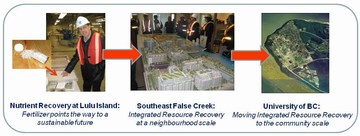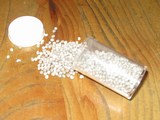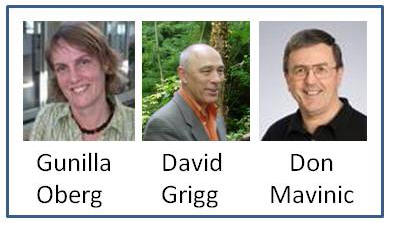Three Metro Vancouver examples demonstrate a progression in scale for Integrated Resource Recovery

Metro Vancouver’s Liquid Resource Management Plan
Appointed by the Metro Vancouver Regional Board in April 2008 to provide independent advice and recommendations regarding the management of liquid discharges and rainwater, the Liquid Waste Management Reference Panel presented their Final Report on A Liquid Resource Management Plan for Metro Vancouver to the Waste Management Committee on July 15, 2009.
The policy framework proposed by the Reference Panel is founded on the premise that Metro Vancouver will manage sewage and rainwater as resources, not wastes. The Reference Panel recommended that the region strive to achieve Integrated Resource Recovery progress incrementally.
Integrated Resource Recovery
 Integrated Resource Recovery (IRR) begins when waste is viewed as a potential resource – not something to be disposed of. In an IRR approach, plans for municipal infrastructure are developed in an integrated and holistic manner to maximize the value of ‘recovery’ from waste resource streams.
Integrated Resource Recovery (IRR) begins when waste is viewed as a potential resource – not something to be disposed of. In an IRR approach, plans for municipal infrastructure are developed in an integrated and holistic manner to maximize the value of ‘recovery’ from waste resource streams.
This approach mimics the closed-loop cycles present in all ecosystems, provides local sources of energy, water and other resources, and reduces demand from external or new sources. As in nature, water, carbon and nutrients are treated as renewable resources and continually recycled: nature has no waste.
To Learn More:
Reference: Resources from Waste: A Guide to Integrated Resource Recovery, published by the Province of British Columbia in 2009).
Metro Vancouver Vision
IRR is now part of the Metro Vancouver vision. Three examples illustrate how quickly the vision is becoming reality; and furthermore, the three examples illustrate a progression by scale – from treatment plant to neighbourhood (Southeast False Creek) to community (University of BC).
Nutrient Recovery
Researchers at UBC have developed the technology to capture phosphorus and ammonia from sewage and recycle them into environmentally safe fertilizer – this is at a time when the world is facing a phosphate shortage.
 “Implementation in Metro Vancouver’s plants should be a high priority, especially since Alberta and Oregon have embraced the technology,” states Dr. Don Mavinc of UBC, leader of the research team and a member of the Reference Panel. “As long as there are people, sewage-based fertilizer will be a renewable and sustainable resource.”
“Implementation in Metro Vancouver’s plants should be a high priority, especially since Alberta and Oregon have embraced the technology,” states Dr. Don Mavinc of UBC, leader of the research team and a member of the Reference Panel. “As long as there are people, sewage-based fertilizer will be a renewable and sustainable resource.”
Neighbourhood Scale
The Southeast False Creek project, which includes the Olympic Village, will showcase some of BC’s most innovative engineering on one unique site.
The development has three focal areas: a neighbourhood energy utility (NEU) that will use raw sewage to generate heat; a legacy of engineering innovation and expertise in the village buildings and surrounding area; and, finally, the reclamation of a former industrial area into a pedestrian and bicycle path with a nature island. After the 2010 Winter Games, Southeast False Creek will eventually be home to an estimated 16,000 people.
Community Scale
According to Don Mavinic,”The community at UBC has embraced a bold vision to disconnect the University Endowment Lands from the Iona sewage treatment plant, and implement a closed-loop system serving a community of 55,000.”
“The experience that will be gained and the lessons that will be learned from the UBC Living Laboratory: Integrated Water and Energy Project can inform the IRR planning for the North Shore and Vancouver Sewerage Areas.”
“By 2014, the UBC vision is that a ‘resource-water’ treatment plant would be constructed at Point Grey. This demonstration project would integrate plant operation with research and teaching /learning. The over-arching goal is to develop a distributed resource-water treatment system which is energy and resource smart and can also be implemented within Metro Vancouver, other cities in Canada and the rest of the world.”
This project is being championed on campus by Gunilla Oberg (Director of the Institute for Resources, Environment and Sustainability, IRES), David Grigg (Associate Director of Infrastructure and Services Planning, Campus and Community Planning) and Don Mavinic, (Associate Head, Department of Civil Engineering).




